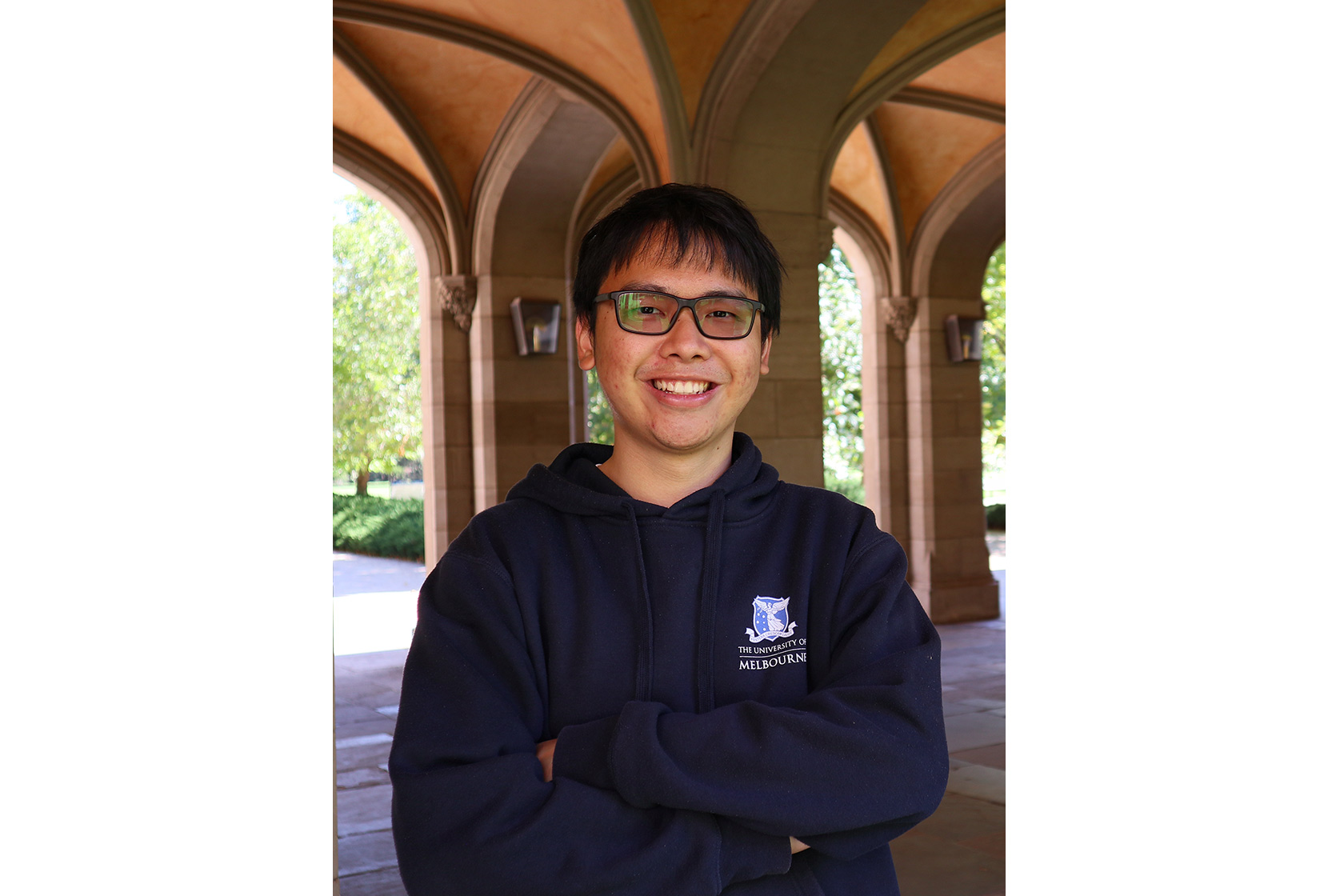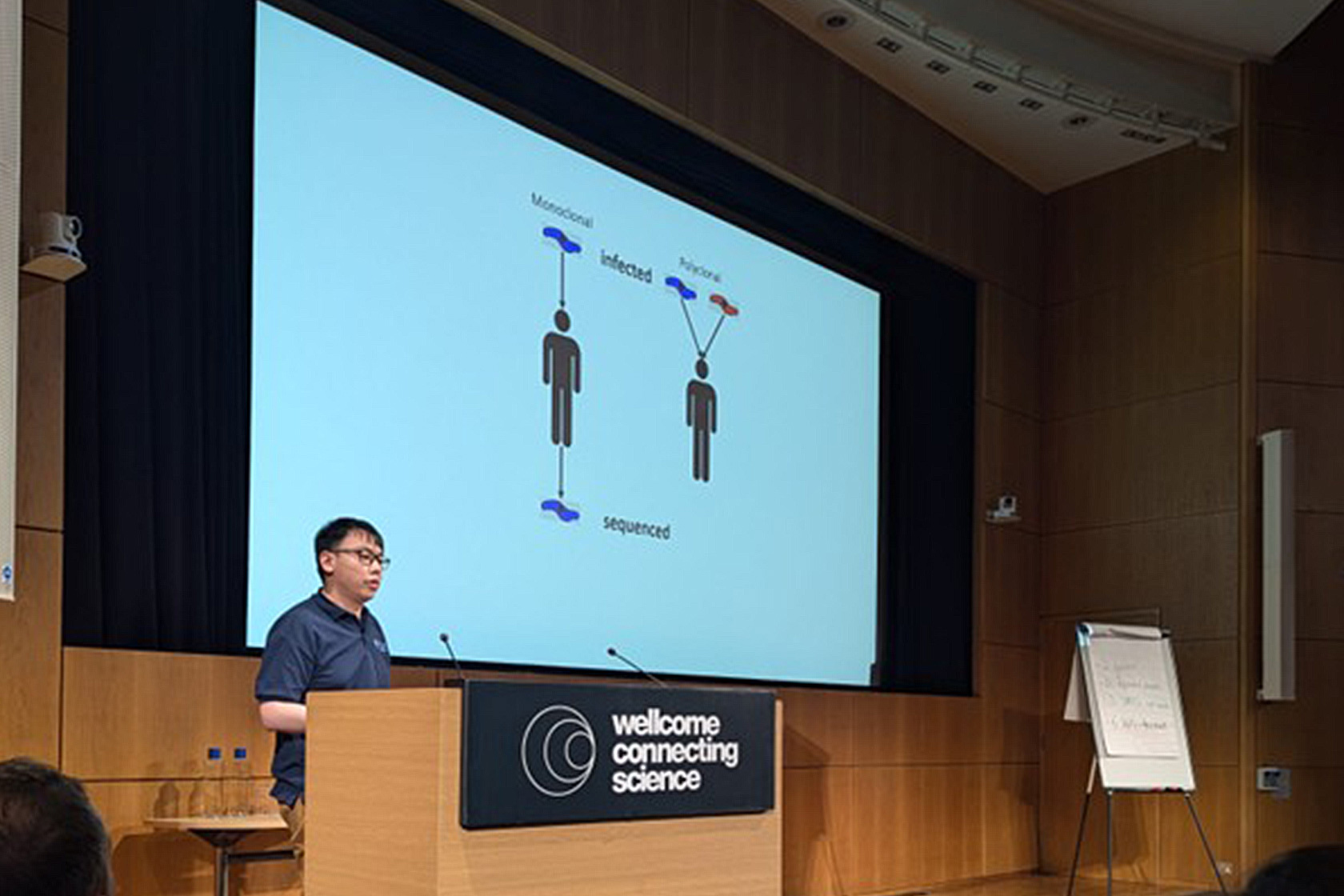
31 October 2025
Join Our Scholarships Information Sessions for Prospective Applicants with Disabilities 2025
Are you ready to take the next step toward a world-class education in Australia? The Australia Award... Read more
The Australia Awards are prestigious, transformational scholarships and short courses offered to emerging leaders for study, research and professional development in Australia

03 November 2025
 Edwin Sutanto: A Bioinformatician on a Quest to Eradicate Malaria
Edwin Sutanto: A Bioinformatician on a Quest to Eradicate Malaria
The more complex a puzzle is to solve, the more important it is to study it from different angles. This is precisely what bioinformatician Edwin Sutanto brings to research on malaria, a deadly disease transmitted by mosquito bites.
Edwin began analysing data on malaria genetics during an internship at the Eijkman Institute for Molecular Biology in 2016, when he was an undergraduate student in Biotechnology at Universitas Katolik Atma Jaya.
'My curiosity to fully comprehend everything I was working on pushed me to pursue further studies,' Edwin recalled. ‘I also wanted to delve deeper into bioinformatics, a field I became somewhat familiar with during my time at the Eijkman Institute.’
In 2020, Edwin began pursuing his Masters of Science (Bioinformatics) at The University of Melbourne through the Australia Awards Scholarship. He describes Bioinformatics as a combination of biology, statistics and computer science.
Discovering a Passion for Bioinformatics
Edwin’s decision to further his studies in Australia was heavily influenced by his supervisors at the Eijkman Institute: Hidayat Trimarsanto, a bioinformatics researcher, and Dr Rintis Noviyanti, a senior research fellow with a special interest in malaria.
‘My two seniors encouraged me to apply for a masters program through the Australia Awards Scholarships, because of the extensive support provided to its awardees during their studies in Australia,’ Edwin said.
Alongside his growing interest in malaria, Edwin's time at the Eijkman Institute also sparked his fascination with bioinformatics, an evolving discipline that leverages computer science to analyse biological data.
One of Edwin's key contributions during his three years at the Eijkman Institute was assisting in the development of vivaxGEN-MS. The open-access platform for collating, analysing and sharing microsatellite genotype data on Plasmodium vivax – one of the parasite species that causes malaria – is now used among malaria researchers worldwide.[1]
Study in Melbourne and Melanoma Research
During his two-year program at The University of Melbourne, Edwin felt he received the perfect combination of theoretical exposure in the classroom and hands-on research experience in the laboratory.
‘I learned a lot from the coursework at The University of Melbourne. I’ve become more familiar with statistics as it relates to bioinformatics, as well as data analytics, algorithms and software management,’ Edwin explained.
However, Edwin did face some challenging times during his studies in Australia, particularly when the COVID-19 pandemic hit. He used the counselling and psychological services provided by The University of Melbourne to help him navigate this difficult period.
‘At that time, the pandemic and the coursework became quite overwhelming for me. The counselling services were extremely helpful in getting me through those difficult times, providing me with mental and emotional support,’ Edwin explained.
Demonstrating great resilience, Edwin was able to continue making the most of his time in Australia. In the midst of the pandemic, in 2020, Edwin became involved in research on melanoma, the most dangerous type of skin cancer.
His former colleague Dr Rintis had encouraged him to connect with WEHI, previously known as the Walter and Eliza Hall Institute of Medical Research, and Professor Tony Papenfuss, a bioinformatics expert working there.
Under Prof Papenfuss’ supervision, Edwin contributed to research on the differing survival rates between men and women with melanoma, focusing on the sex chromosomes of the participants.
Collaborative Research on Malaria
After graduating from The University of Melbourne in January 2022, Edwin’s connections with Australian researchers have led to career opportunities and collaborations across three continents.
Edwin took up the position of Senior Bioinformatician at Excellence Indonesia Health Initiative (EHI), a contract research organisation specialising in research and development in health and molecular medicine.
He was recommended for the role by Associate Professor Sarah Auburn, Principal Research Fellow at Menzies School of Health Research, whom he knew through the vivaxGEN collaboration.
In 2022 he supported collaborative investigations on malaria in Colombia and Ethiopia.
The first was with another researcher from Menzies, Zuleima Pava, who needed a bioinformatician to analyse her data. The study, titled Genomics of Plasmodium vivax in Colombia reveals evidence of local bottlenecking and inter-country connectivity in the Americas, was published in the journal Scientific Reports, issued by Springer Nature in November 2023.[2]
The second was another vivaxGEN collaborative study with Alebachew Messele Kebede, a researcher from the Aklilu Lemma Institute of Pathobiology, Addis Ababa University.
The research, titled, Genomic analysis of Plasmodium vivax describes patterns of connectivity and putative drivers of adaptation in Ethiopia, was published in the same journal in November 2023.[3]
Dr Auburn also encouraged Edwin to apply for travel funding to participate in the Molecular Approaches to Malaria (MAM) 2024 conference. The international conference was dedicated to discussing all aspects of malaria and brought together research groups from around the world.[4]
Edwin was successful, and in February 2024, he returned to Victoria for the event. He presented his research in a new vivaxGEN project titled Deconvolving genetic complexity in Plasmodium vivax infections, which spotlights Menzies and EHI's commitment to eradicating all forms of malaria.
‘For a total of five days, everything about malaria was discussed there, from malaria proteins and genes to malaria species, vectors and life cycle,’ said Edwin.
Then, in September 2024, Edwin presented new data from the same research project in the United Kingdom at the 9th Genomic Epidemiology of Malaria Conference held at the Wellcome Genome Campus.[5]
Working to Eradicate Malaria in Papua
Currently, Edwin and EHI are conducting malaria research in Papua. This study, in collaboration with Dr Rintis from the National Research and Innovation Agency (BRIN) and Dr Auburn’s team at Menzies, is expected to contribute to the elimination of malaria cases in Papua, which has the highest malaria incidence in Indonesia.
‘I performed data analysis to highlight research areas that need further testing and advised on how to analyse these samples further,’ Edwin said.
The Indonesian Ministry of Health recorded 418,546 malaria cases in Indonesia in 2023. In Papua, 369,119 cases were found, followed by 6,968 cases in East Nusa Tenggara and 1,557 cases in Gorontalo.[6]
Having now worked as a bioinformatician for almost 5 years, Edwin wants to continue deepening his malaria research to improve malaria elimination and control programs in Indonesia.
‘I also want to advance the field of bioinformatics in Indonesia,’ he says. ‘With Indonesia's vast biodiversity, it is unfortunate that there are still not many people capable of analysing this biodiversity.’






[1]https://www.menzies.edu.au/page/Research/Projects/Malaria/vivaxGEN_A_global_collaboration_using_translational_genomics_to_develop_new_molecular_surveillance_tools_to_support_the_elimination_of_P_vivax/Resources/
[2] https://www.nature.com/articles/s41598-023-46076-1
[3] https://www.nature.com/articles/s41598-023-47889-w
[4] https://exeins.org/ehi-represented-indonesia-at-molecular-approaches-to-malaria-2024/
[5] https://exeins.org/ehi-presented-at-genomic-epidemiology-of-malaria-2024/
[6] https://www.cnnindonesia.com/gaya-hidup/20240425143317-255-1090424/418-ribu-kasus-malaria-di-indonesia-tertinggi-di-papua
Share this news on:
 Related News
Related NewsThis website uses cookies to improve your website experience. We may also use cookies to analyse website data so that we can improve our online services. To find out more visit our privacy policy.
